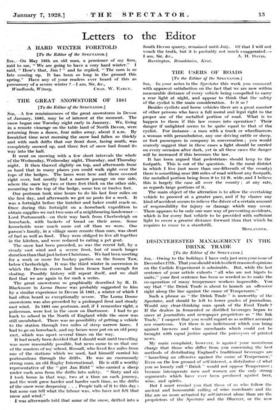THE GREAT SNOWSTORM OF 1881 [To the Editor of the
SPECTATOR.]
Sta,—A few reminiscences of the great snowstorm in Devon of January, 1881, may be of interest at the moment. The snow began one Tuesday night early in January. We, living in a remote vicarage on the table land of North Devon, were returning from a dance, four miles away, about 2 a.m. By breakfast time next morning the snow had fallen so thickly and with such drifts that our front door, facing south, was completely snowed up, and three feet of snow had found its way into the hall.
It went on snowing with a few short intervals the whole of the Wednesday, Wednesday night, Thursday, and Thursday night. It then thawed slightly on top, and afterwards froze so hard that in many places you could walk right over the tops of the hedges. The lanes were here and there covered right over, but mostly had a narrow passage on one side, where the snow lay two or three feet thick on the other side, mounting to the top of the hedge, some ten or twelve feet.
Our postman took nine hours to do his last four miles on the first day, and afterwards we got no posts for a week. It was a fortnight before the butcher and baker could reach us. Once during this fortnight on a . horseback expedition to obtain supplies we met two sons of a neighbouring landowner— Lord Portsmouth—on their way back from Cherberleigh on horseback, with baskets of bread on their arms. Some households were much more cut off than we were. One parson's family, in a village more remote than ours, was short of fuel as well as food. They were obliged to live all together in. the kitchen, and were reduced to eating a pet goat.
The snow had been preceded, as was the recent fall, by a steady east wind and a severe frost, but of much longer duration than that just before Christmas. We had been meeting for a week or more for hockey parties on the frozen Taw, below Cherberleigh. It was the third winter in succession in which the Devon rivers had been frozen hard enough for skating. Possibly history will repeat itself, and we shall find that we are again in for such a series.
The great snowstorm so graphically described by R. D. Blaekmore in Lorna Doone was probably suggested to him by a similar experience in Devon in 1861, a winter of which I had often heard as exceptionally severe. The Lorna Doone snowstorm was also preceded by a prolonged frost and steady east wind. In 1881 one postman, and, if I remember right, a policeman, were lost in the snow on Dartmoor. I had to go back to school in the North of England while the snow was still unsubdued. There was no possibility of getting a vehicle to the station through two miles of steep narrow lanes. I had to go on horseback, and my boxes were put on an old pony cart, which was upset several times on the way.
' • It had nearly been decided that I should wait until travelling was more reasonably possible, but news came to us that one of the masters of my school, Rossall, who lived five miles from one of the stations which we used, had himself carried his portmanteau through the drifts. He was an enormously Strong man, an old Rugby International. He is still a worthy representative of the " girt Jan Ridd " who carried a sheep under each arm from the drifts into safety. " Sixty and six I took home in that way, two at a time on each journey, and the work grew harder and harder each time, as the drifts of the snow were deepening . . . People talk of it to this day : but none can tell what the labour was, who have not felt that snow and wind."
I was afterwards told that some of the snow, drifted into a South Devon quarry, remained until July. Of that I will not vouch the truth, but it is probably not much exaggerated.— I am, Sir, &c., A. H. DAVIS. Barrington, Broadstairs, Kent.






































 Previous page
Previous page